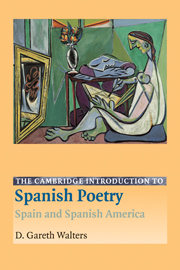Book contents
- Frontmatter
- Contents
- Preface
- Introduction
- 1 Poets and readers
- 2 The interrelationship of texts
- 3 The epic and the poetry of place
- 4 The ballad and the poetry of tales
- 5 Songs and sonnets – popular and learned poetry
- 6 Love poetry
- 7 Religious and moral poetry
- 8 Satire, burlesque and poetry as celebration
- Appendix: Chronological list of poets cited
- Notes
- Bibliography
- Index of names
- Subject index
3 - The epic and the poetry of place
Published online by Cambridge University Press: 05 June 2012
- Frontmatter
- Contents
- Preface
- Introduction
- 1 Poets and readers
- 2 The interrelationship of texts
- 3 The epic and the poetry of place
- 4 The ballad and the poetry of tales
- 5 Songs and sonnets – popular and learned poetry
- 6 Love poetry
- 7 Religious and moral poetry
- 8 Satire, burlesque and poetry as celebration
- Appendix: Chronological list of poets cited
- Notes
- Bibliography
- Index of names
- Subject index
Summary
The term ‘epic’ has suffered a curious fate. In modern times it is used quite indiscriminately to refer to something that is grand, large-scale or momentous, ranging from buildings to films and to sporting encounters. Yet it is seldom if ever employed for its original purpose: to refer to a specific poetic genre. Indeed one may wonder if its disappearance as a definition for long and ambitious modern poems is a fastidious reaction to its devaluation as a distinctive designation or a simple recognition that no such poems are composed nowadays because we live in unheroic times. What I believe to be beyond dispute, however, is that the idea, if not the form, of epic has been very much alive in the poetry of Spain and, more particularly, Spanish America in the last century, although the relationship of such derivatives or resonances of epic to epic proper betrays that creative unease associated with intertextuality.
Epic poetry is found in many civilizations and cultures. Although not as universal as folk-song or primitive song it nevertherless occurs over a wide time-scale: the earliest extant poem, the Sumerian epic Gilgamesh dates from around 3000 bc. This together with the Homeric epics, Iliad and Odyssey, of some two thousand years later are examples of oral, or what is also known as primary, epic. In this context Beowulf, a work composed between the eighth and tenth centuries, is a comparatively recent poem.
- Type
- Chapter
- Information
- The Cambridge Introduction to Spanish PoetrySpain and Spanish America, pp. 63 - 84Publisher: Cambridge University PressPrint publication year: 2002



